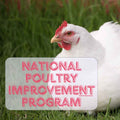
National Poultry Improvement Program: Safeguarding Poultry Health & Bio Security
Ensure the health and quality of your poultry with the National Poultry Improvement Plan (NPIP). Discover how NPIP certification safeguards against diseases like Salmonella and Avian Influenza, enhances biosecurity, and supports market access.
N.P.I.P. certification is required to ship live poultry across state lines.
Subscribe
To join our mailing list and never miss an update!
The National Poultry Improvement Plan (NPIP) is a cornerstone of the United States' efforts to maintain and enhance the health, quality, and biosecurity of its poultry industry. Established in 1935 by the United States Department of Agriculture (USDA), this voluntary program plays a crucial role in monitoring and controlling poultry diseases, ensuring that American poultry products meet the highest standards for safety and quality.
Benefits of NPIP Participation
By meeting the stringent bio-security guidelines and documenting regular clean test results for common poultry diseases, member certification is the gold seal of professionalism that your customers want to make a confident purchase. As a poultry breeder or hatchery, having NPIP certification allows you to legally ship hatching eggs, day old chicks and adult poultry across state lines. Participation in the program also offers additional resources, educational opportunities and assistance to members.

Disease Control and Prevention
At the heart of NPIP's mission is the control and prevention of specific poultry diseases that pose significant risks to both the poultry industry and public health. The program is particularly focused on diseases like Salmonella, Mycoplasma, and Avian Influenza, which can have devastating economic and health impacts if left unchecked. Participants in the NPIP adhere to rigorous testing and biosecurity protocols designed to keep these diseases at bay, ensuring that their flocks remain healthy and free from infection.
Certification and Compliance
NPIP offers certification to hatcheries, breeders, and backyard flocks that meet its stringent standards. This certification verifies to buyers that the birds or hatching eggs they purchase come from flocks that have been meticulously tested and managed to prevent disease spread. For many producers, NPIP certification is not just a mark of quality—it's a vital credential for accessing certain markets, both within the U.S. and internationally. Many buyers, particularly those in regulated markets, require NPIP certification as a condition of sale, making compliance with the program essential for commercial success.

Biosecurity and Best Practices
A key component of NPIP is its emphasis on biosecurity measures, which are critical to preventing the introduction and spread of diseases within and between poultry operations. These measures include controlling visitor access to poultry facilities, maintaining clean and sanitized environments, and conducting regular disease testing. The NPIP also provides guidelines on record-keeping, sanitation, and overall flock management, helping participants maintain the highest standards of health and safety.
Collaborative Effort
The success of NPIP is largely due to its collaborative nature. The program is a joint effort involving state and federal governments, industry representatives, and poultry producers. While the USDA provides oversight, NPIP is administered at the state level, ensuring that the program's standards are consistently applied across the country.
Impact on Trade and Commerce
NPIP certification is widely recognized as a mark of quality in the poultry industry, both domestically and internationally. By providing assurance that poultry and poultry products are disease-free, NPIP facilitates trade and commerce, opening doors to markets that might otherwise be inaccessible. NPIP certification is required in the U.S. to ship birds and hatching eggs across state lines. In an increasingly globalized economy, this certification is crucial for maintaining the competitiveness of U.S. poultry producers on the world stage.

Focus on Critical Poultry Diseases
The NPIP's disease testing program is vital to maintaining the health of the U.S. poultry population. The program primarily focuses on a few key diseases that can have severe consequences for both poultry health and public safety.
• Salmonella Pullorum and Salmonella Gallinarum: These bacterial infections are significant concerns in the poultry industry due to their potential to cause high mortality rates, particularly in young birds. Pullorum disease and fowl typhoid, caused by these bacteria, can devastate flocks if not properly managed.
• Mycoplasma Species: The NPIP tests for several Mycoplasma species, including Mycoplasma gallisepticum, Mycoplasma synoviae, and Mycoplasma meleagridis, all of which can lead to chronic respiratory diseases and other health issues in poultry. These infections can severely impact flock productivity and overall health.
• Avian Influenza (AI): Avian Influenza is a viral infection that can range from low pathogenic (LPAI) to highly pathogenic (HPAI) strains. The NPIP focuses on monitoring for HPAI strains, which can cause severe illness and death in poultry and have significant public health implications.
• Salmonella Enteritidis (SE): This strain of Salmonella is particularly concerning because it can contaminate eggs and pose a risk to human health. The NPIP tests for SE, especially in breeder flocks producing eggs for human consumption.
• Other Diseases: The NPIP is adaptable and can address other emerging threats as needed, depending on regional concerns and the evolving landscape of poultry health.
Trending Articles
Rigorous Testing Protocols
NPIP participants are subject to regular disease testing, twice a year, based on the program's current standards. These tests are conducted on breeder flocks, hatcheries, and any poultry owner who wishes to participate in the program. Flocks that pass these tests receive NPIP certification, a mark of quality and health assurance that is highly valued in the poultry industry.
Essential Documentation and Compliance
In addition to routine disease testing, participation in the NPIP involves completing a series of forms and documents that are critical for tracking flock health, disease testing, and compliance with the program's standards. These forms, such as the Flock Selecting and Testing Report (VS Form 9-2) and the Report of Sales of Hatching Eggs, Chicks, and Poults (VS Form 9-3), ensure that all aspects of flock management and disease control are thoroughly documented. Accurate record-keeping and compliance with NPIP requirements are not only necessary for maintaining certification but also for contributing to the overall biosecurity of the national poultry population.
Visit the website for more information and to sign up for this vital program at https://www.poultryimprovement.org/ The website will give you an even greater understanding of how the program works and who to contact in your state for enrollment.
The National Poultry Improvement Plan (NPIP) is an indispensable tool for poultry producers in the United States. By offering a comprehensive framework for disease control, certification, and biosecurity, the NPIP helps ensure that American poultry products are among the safest and highest quality in the world. Participation in NPIP not only enhances a producer's marketability but also plays a crucial role in protecting public health and supporting the economic vitality of the U.S. poultry industry. As the industry continues to evolve, the NPIP remains a vital resource for maintaining the health and integrity of the nation's poultry population.
Trending Products
Copyright©2024 All rights reserved. We love to have you share our article as long as you include a direct link to this page. This article or any portion thereof , including all images, may not be reproduced or used in any manner whatsoever without the express written permission of Gypsy Shoals Farm.




